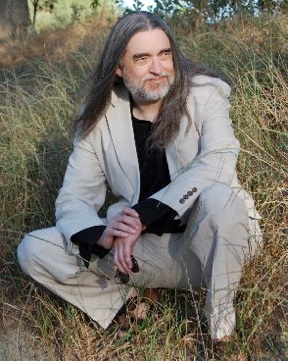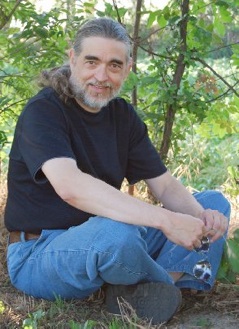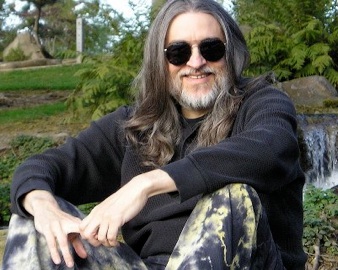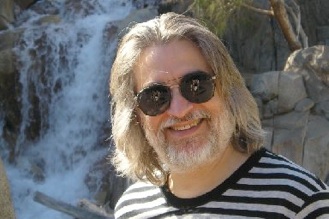Multi-instrumentalist Michael Stribling has released four electronic CDs in the past two years that have been garnering very favorable reviews as well as award recognition. Michael was a professional musician (mostly percussion) for quite a few years during and after college (notably as Johnny Mathis’ drummer), and then he went back to college to become a marriage and family therapist. He returned to music in 2005, and his debut CD, “Songs of Hope and Healing,” reached #1 on the New Age Reporter charts and received their “Best Electronic Album of the Year” award. Michael’s story is a very interesting one, and I think you’ll enjoy getting to know him as much as I have!
KP: You have released a remarkable amount of new music in the past couple of years. How is “Love, Light, and Water” doing?
Stribling: I suppose releasing four CDs in two years is considered pretty prolific. Maybe working in the jingle industry all those years ago helps me produce music fairly quickly. Currently, I have a compilation CD that's just waiting to be released (still figuring out the timing and logistics), and a couple more projects are at about the halfway point in their development. What can I say? I love this stuff (and the Muse is generous in her contributions)! Love, Light, and Water reached #4 on the New Age Reporter Top 100 List last summer. The competition during the two-month radio promotion included Michael Dulin and Will Ackerman, both of whom are formidable artists. More than one reviewer thought that LLW is my best work to date. In any event, that's four consecutive CDs in the top 4, and that's pretty gratifying :-).
KP: Yes, indeed! How did you come up with the title “Love, Light, and Water,” and what is the general theme of the album?
Stribling: For LLW, I focused on developing a concept album. While Another Day in Paradise probably falls into that category, too (at least, for the most part), LLW was an attempt to provide essentially the same musical feel throughout, as well as related themes. I got some feedback from yoga studios saying they liked most of the music on my CDs, but when an up-tempo piece came around, it tended to spoil the tranquility of the moment and was a bit jarring. So, among other things, LLW attempts to maintain the same basic mood and feel throughout. I didn't set out to write a theme album, per se; however, as the compositions developed, I noticed that the tunes seemed to center around three themes: love, light, and water. And when I started sequencing the pieces, they seemed to fit well together in those three groups. Rather serendipitous, huh? (Funny how things tend to work out that way :-) ) The last two tunes don't seem to fall neatly into the three categories; however, they reflect what I'm going to call a "move heavenward" at the end of the album. By that I mean there's a refocus on, or return to, a higher theme; i.e., love, light, and water point to their source, the Divine energy, and "Quiet Conversation" and "At the Gates" both reflect a return to that sacred space.
KP: You have had quite a varied career. Tell us about it.
Stribling: In some ways, it doesn't feel like there's a whole lot to say. I was very active in music for several years, and then I changed careers. In retrospect, that second career lasted longer than the musical career. In "My Musical Career, Part 1" (which I count as starting when I went to college in 1969), I enjoyed a wide variety of opportunities. I had chosen percussion performance as my major, and that meant I played in everything from marching band, to concert band, to jazz band, to the philharmonic, etc. (I even performed in a couple of theater productions, both as an actor and as a musician). Along the way (and all within my undergraduate years), I got into radio. The station's format was what is now called Classic Rock, but we were playing that music when it was new. (Just think. I got paid to listen to my favorite music six nights a week. Not a bad gig!) After radio and the Johnny Mathis gig were behind me, I was part of a group of folks who worked in a first-rate 16-track studio (first rate for 1976, at least), and we did a lot of radio/TV jingles and music albums. (Oh, the days of analog reel-to-reel and cassette tape!)
KP: How long did you work with Johnny Mathis?
Stribling: I traveled on the road gigs with John for a little over a year, in the mid '70s. My first gig was in Hawaii. The next gig was the Newport Jazz Festival in Manhattan, where John did a duet with Mabel Mercer, in Lincoln Center. Coming from a small town (Merced, CA), that was pretty heady stuff. Other highlights included six weeks in England, Scotland, and Wales; a variety TV show in Paris; a concert for Grace Kelly in Monte Carlo; and the best highlight of all was working with John and listening to that amazing vocal talent night after night. I'm very grateful for that experience.
KP: When did you start playing the piano?
Stribling: I think I was seven. I took lessons into my high school years, and was trained classically (I seem to recall playing a Rachmaninoff piece for my final recital). But along the way, I also played clarinet and violin for a while, and in the early '60s I got my first acoustic guitar. (Heck, everyone was playing folk tunes at that time.)
KP: When did you start playing percussion?
Stribling: When the Beatles first came to America in early 1964, I made the switch to drums as my primary interest and never really looked back. I still played some piano and guitar, but my focus shifted to drums. Then, when I went to college, that focus expanded to all things percussion, including mallet instruments (I remember playing a Bach flute sonata on a marimba for one of my early recitals), timpani (I was one of the featured percussionists when the local philharmonic orchestra performed a Bartok Concerto for Two Pianos and Percussion), and the wonderful world of "toys" (all the handheld instruments that make such delightful sounds). Like so many other musicians, I also played my share of wedding receptions, New Year's Eve gigs, and the like. I also played for a dinner theater company for several years, which meant playing music behind lots of musicals (Sound of Music; Fiddler on the Roof; The King and I; My Fair Lady; etc.).
KP: Did you play both piano and percussion as a young person or did you let the piano go?
Stribling: For a while, it seemed liked I played a bit of all the instruments, but over time the clarinet and violin disappeared, the piano fell to third place behind guitar, and percussion moved to first place. (On the other hand, my sister continued her studies and moved on to become a rather accomplished concert pianist. She can still move me to tears with her playing.)
KP: Have you always lived in Fresno, CA or were you a disc jockey somewhere else?
Stribling: I grew up in Merced, CA, which is about an hour north of Fresno. I moved to Fresno to go to college (California State University Fresno) in 1969. I moved to Pasadena in 1981 to attend graduate school and returned to Fresno in 1989. Except for a year I spent elsewhere, completing my marriage and family therapy internship, I've been in Fresno ever since. (By the way, the radio stuff was in Fresno in the early '70s.)
KP: Where did you have your marriage and family counseling practice? Are you still working as a counselor?
Stribling: I had a private practice in the '90s, but I mostly worked in the mental health field, for other agencies, in a variety of areas (e.g., substance abuse treatment, psychiatric triage, group homes, foster care, community-based mental services, etc.). I am not currently providing mental health services; however, I am a lead faculty for a large university, working with undergraduate human services majors, so I'm training aspiring young therapists rather than providing therapy directly to clients.
KP: What brought you back to music?
Stribling: A couple of fairly significant life situations brought me the opportunity for change. In early 2005, in the span of just a couple of months, I lost an important relationship and a job, and I found myself asking, "What do I do now?" I felt like I was starting over in some ways, and I asked that famous question, "What would you do if you won the lottery?" The answer was simple. I'd go back to music. And I did. I set the early goal of producing a new age CD, more as personal therapy for the transition I was going through. I got to work, if for no other reason than to say I finally did my own project, just for me, with no other egos involved (been there, done that). I blew the dust off some tunes that had been lying around for a long while, wrote some new material, and completed Songs of Hope and Healing sometime in 2005 (didn't release it until June 2006). The rest, as they say, is history. SHH reached the #1 spot on New Age Reporter's Top 100 List, and it received their 2006 Lifestyle Music Award for best Electronic Album. I guess you could say that encouraged me to continue composing and producing music :-).
KP: That should do it! Why did you name your label “Leela Music”?
Stribling: “Leela” is a Hindu word or concept that means "divine play", i.e., the way that God plays. (By the way, there is no relation or connection to the characters by that name in the TV series, Futurama or Doctor Who, in case anybody was wondering.) I discovered the word while reading the books by David R. Hawkins, MD, whose work continues to be a major spiritual influence in my life. It seems to me that making music is the best fun/play there is. (Well, let me think about that for a minute. Sex may also fall into the category of divine play :-) [P.S. I'm currently developing an offshoot, Leela Radio, which hopefully will be my own version of what is currently available on Live365, etc. but from my own (under construction) website. Initially, I'm going to offer my music in an internet radio format, and I'm hoping to add other artists in the future]
KP: Are you a full-time musician now?
Stribling: Not yet. Maybe not ever. I'm still actively involved in the university (I've been there over 9 years), and I seem to be spending a lot of time on website development these days, so music has to take its turn in my daily life. Spiritual development is another priority item, which also takes time and from which everything else flows.
KP: Do you perform live very often?
Stribling: Currently, I'm not performing live at all. Anyone familiar with my music will know that much of it would require a Yanni-sized orchestra to perform. Even the less ambitious tunes involve several parts, which I can handle one track at a time in the studio, but which do not lend themselves easily to live performance. I haven't found the people (let alone the time) to put a group together, and there's very little purely solo material in my catalog. Besides, I've been on the road and am not in a big hurry to do that again any time soon. I guess it may be more accurate to describe myself as a composer more than a performer.
KP: Are you working on your next album? If so, can you give some hints about what it will be like?
Stribling: My first compilation CD (Union - Music for Lovers) assembles the best mellow compositions from the first four CDs, and a demo CD seems to validate that it works well as music for lovemaking :-) ). As I mentioned earlier, the CD is essentially ready to go (even the cover design is mostly done); I'm just trying to determine the best time to release it. Frankly, with more people downloading their music a tune at a time, the idea of releasing a CD of previously released material doesn't seem to make as much sense as it once did. We'll see. As for other projects, I'm collecting my favorite up-tempo material and writing some additional energetic compositions, which I hope to release as Getting' the Yang of It at some point; however, up-tempo new age music doesn't seem to get much radio play (although I seem to remember you liked "Driven" a lot :-) ). Also, somewhere in mothballs is an idea for a mostly percussion project, with a working title of Skin, Wood, and Metal; we'll have to see about that one. I've got lots of music in me, I guess. I'm also still working on a hypnosis project where the music will accompany a book and support the author's spoken meditations.
KP: I guess that, other than that, you just sit around eating bonbons! Talk about a plate full of projects! And, yes, I really like “Driven” and your other upbeat music as well as the quieter, dreamy stuff. What has been your most exciting musical moment so far?
Stribling: I think for a long time it was the highlights package of the Johnny Mathis gig; however, reaching the #1 spot and winning the Lifestyle Music Award in 2006 have become the new frontrunners.
KP: Who and/or what are some of your musical influences?
Stribling: There are so many influences because I have enjoyed so many styles of music. There's pop, rock, jazz, classical, and of course new age. And there are many artists in each category whom I admire. As it relates directly to new age music, I'd have to include Paul Winter, Steve Roach, Michael Dulin, Alex de Grassi, Vangelis, Patrick O'Hearn (and there are many more), and each for different reasons. I'm also aware of the influence of Jan Hammer, The Beatles, Joni Mitchell, Peter Gabriel, Steely Dan, J. S. Bach, Igor Stravinsky, The Mahavishnu Orchestra, etc.. I have to be careful about this, though. Out of an even longer list, the folks at Soundscapes cable radio singled out listing Chick Corea, Jimi Hendrix, and Frank Zappa as my influences, none of whom are usually included in a discussion of new age music :-).
KP: That’s about as varied a list as I’ve seen! Do you have any favorite composers or performers?
Stribling: See above. In addition, I suppose I might want to add some of the major film score composers (again, another long list), and in a totally different category, I really enjoy the performance chops of Dream Theater. Talk about eclectic taste!
KP: Do you play acoustic piano very often or mostly keyboards?
Stribling: I play mostly one keyboard (my trusty old Ensoniq), which has served me well enough to this point, but I'm moving toward adding another keyboard with some nice hammer action in the near future.
KP: Is there a philosophy that you try to convey in your music?
Stribling: Hmm. That's a challenging question to answer in 25 words or less :-). Here are the first words that come to mind: Divinity/God/Self. Energy. Vibration. Resonance.
Consciousness. Awareness. Love. Light. Oneness. I like to think that life is basically about three things: to grow; to love; to serve. Along the path, the task is to seek higher levels of consciousness, and avoid lower levels; it's really that simple. Music can help lift the human spirit to higher levels of awareness, although some music can scramble our neural pathways and actually lower our level of consciousness. Perhaps the mission of Leela Music says it well: "The mission of Leela Music is to help others in their journey toward wholeness through the gift of music, by creating works that inspire and uplift the human spirit." Beyond that, the "Spiritually Speaking" entries in my monthly newsletters may add to the answer to your question. [Although the website is still under construction, I've at least placed all the newsletters online. If you're interested, you can look them up at
free-new-age-music-and-more.com/newsletters. My spiritual/philosophical leanings are reflected in those writings]
KP: What’s up next for you?
Stribling: Lunch, I think :-).
Kathy Parsons
November 2008




